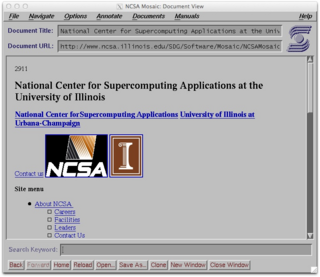Related Research Articles

The World Wide Web is an information system that enables content sharing over the Internet through user-friendly ways meant to appeal to users beyond IT specialists and hobbyists. It allows documents and other web resources to be accessed over the Internet according to specific rules of the Hypertext Transfer Protocol (HTTP).

NCSA Mosaic was among the first widely available web browsers, instrumental in popularizing the World Wide Web and the general Internet by integrating multimedia such as text and graphics. Mosaic was the first browser to display images inline with text.

Cello is an early, discontinued graphical web browser for Windows 3.1; it was developed by Thomas R. Bruce of the Legal Information Institute at Cornell Law School. It was released as shareware in 1993. While other browsers ran on various Unix machines, Cello was the first web browser for Microsoft Windows, using the winsock system to access the Internet. In addition to the basic Windows, Cello worked on Windows NT 3.5 and with small modifications on OS/2.

Archie is a tool for indexing FTP archives, allowing users to more easily identify specific files. It is considered the first Internet search engine. The original implementation was written in 1990 by Alan Emtage, then a postgraduate student at McGill University in Montreal, Canada. Archie was superseded by other, more sophisticated search engines, including Jughead and Veronica, which were search engines for the Gopher protocol. These were in turn superseded by search engines like Yahoo! in 1995 and Google in 1998. Work on Archie ceased in the late 1990s. A legacy Archie server was maintained for historic purposes in Poland at Interdisciplinary Centre for Mathematical and Computational Modelling in the University of Warsaw until 2023.
WorldWideWeb is the first web browser and web page editor. It was discontinued in 1994. It was the first WYSIWYG HTML editor.
ALIWEB is the first Web search engine.

Timothy William Bray is a Canadian software developer, environmentalist, political activist and one of the co-authors of the original XML specification. He worked for Amazon Web Services from December 2014 until May 2020 when he quit due to concerns over the terminating of whistleblowers. Previously he has been employed by Google, Sun Microsystems and Digital Equipment Corporation (DEC). Bray has also founded or co-founded several start-ups such as Antarctica Systems.

Yahoo! Native is a native "Pay per click" Internet advertising service provided by Yahoo.

Western Colorado University is a public university in Gunnison, Colorado. It enrolls approximately 3,000 undergraduate and 450 graduate students, with 25 percent coming from out of state.

Alan Emtage is a Bajan-Canadian computer scientist who conceived and implemented the first version of Archie, a pre-Web Internet search engine for locating material in public FTP archives. It is widely considered the world's first Internet search engine.

A search engine is a software system that provides hyperlinks to web pages and other relevant information on the Web in response to a user's query. The user inputs a query within a web browser or a mobile app, and the search results are often a list of hyperlinks, accompanied by textual summaries and images. Users also have the option of limiting the search to a specific type of results, such as images, videos, or news.

The World Wide Web is a global information medium that users can access via computers connected to the Internet. The term is often mistakenly used as a synonym for the Internet, but the Web is a service that operates over the Internet, just as email and Usenet do. The history of the Internet and the history of hypertext date back significantly further than that of the World Wide Web.

Alan Kotok was an American computer scientist known for his work at Digital Equipment Corporation and at the World Wide Web Consortium (W3C). Steven Levy, in his book Hackers: Heroes of the Computer Revolution, describes Kotok and his classmates at the Massachusetts Institute of Technology (MIT) as the first true hackers.
WWWW may refer to:

Jaime Guillermo Carbonell was a computer scientist who made seminal contributions to the development of natural language processing tools and technologies. His extensive research in machine translation resulted in the development of several state-of-the-art language translation and artificial intelligence systems. He earned his B.S. degrees in Physics and in Mathematics from MIT in 1975 and did his Ph.D. under Dr. Roger Schank at Yale University in 1979. He joined Carnegie Mellon University as an assistant professor of computer science in 1979 and lived in Pittsburgh from then. He was affiliated with the Language Technologies Institute, Computer Science Department, Machine Learning Department, and Computational Biology Department at Carnegie Mellon.

JumpStation was the first WWW search engine that behaved, and appeared to the user, the way current web search engines do. It started indexing on 12 December 1993 and was announced on the Mosaic "What's New" webpage on 21 December 1993. It was hosted at the University of Stirling in Scotland.

The First International Conference on the World-Wide Web was the first-ever conference about the World Wide Web, and the first meeting of what became the International World Wide Web Conference. It was held on May 25 to 27, 1994 in Geneva, Switzerland. The conference had 380 participants, who were accepted out of 800 applicants. It has been referred to as the "Woodstock of the Web".
MetaCrawler is a search engine. It is a registered trademark of InfoSpace and was created by Erik Selberg.
References
- ↑ This article is based on material taken from World+Wide+Web+Worm at the Free On-line Dictionary of Computing prior to 1 November 2008 and incorporated under the "relicensing" terms of the GFDL, version 1.3 or later.
- ↑ "The Anatomy of a Search Engine". www7.scu.edu.au. Archived from the original on 2019-07-02. Retrieved 2019-02-06.
- ↑ McCullough, Brian (November 6, 2016). "Was The World Wide Web Worm the First Web Search Engine?". Internet History Podcast. Retrieved 2019-02-06.